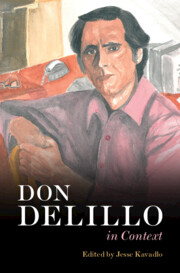Book contents
- Don DeLillo In Context
- Don DeLillo In Context
- Copyright page
- Contents
- Contributors
- Acknowledgments
- Abbreviations
- Introduction: Context, Content, Conflict
- Part I Places
- Part II History and Politics
- Chapter 5 The Cold War
- Chapter 6 The Kennedy Assassination
- Chapter 7 Terrorism
- Chapter 8 The Twenty-First Century
- Chapter 9 Prescience
- Part III Media and Pop Culture
- Part IV Literary Contexts
- Part V Material Contexts
- Part VI Social and Cultural Constructions
- Part VII Writing and Writers
- Further Reading
- Index
- References
Chapter 7 - Terrorism
Terrorism as Context in DeLillo
from Part II - History and Politics
Published online by Cambridge University Press: 19 May 2022
- Don DeLillo In Context
- Don DeLillo In Context
- Copyright page
- Contents
- Contributors
- Acknowledgments
- Abbreviations
- Introduction: Context, Content, Conflict
- Part I Places
- Part II History and Politics
- Chapter 5 The Cold War
- Chapter 6 The Kennedy Assassination
- Chapter 7 Terrorism
- Chapter 8 The Twenty-First Century
- Chapter 9 Prescience
- Part III Media and Pop Culture
- Part IV Literary Contexts
- Part V Material Contexts
- Part VI Social and Cultural Constructions
- Part VII Writing and Writers
- Further Reading
- Index
- References
Summary
This chapter delves into one of DeLillo's frequently recurring themes, terrorism, yet develops the ways in which different novels' approaches to understanding terrorism significantly differ despite their surface similarities.
- Type
- Chapter
- Information
- Don DeLillo In Context , pp. 68 - 76Publisher: Cambridge University PressPrint publication year: 2022



